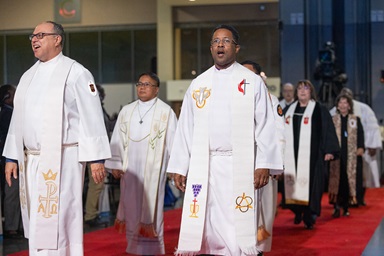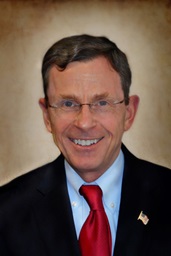Key Points:
- The United Methodist Church’s top court released two decisions related to bishops.
- One decision struck down a petition that General Conference passed earlier this week on retired bishops’ travel expenses.
- The other ruling dealt with the retirement of central conference bishops.
The United Methodist Church’s top court has declared unconstitutional a move by General Conference to have retired bishops pay for their own travel expenses to attend Council of Bishops meetings.
“Under ¶ 47 of the Constitution, the Council of Bishops shall be composed of all bishops of The United Methodist Church,” the Judicial Council said in Decision 1499. “All bishops (active and retired) of The United Methodist Church are authorized to attend meetings of the Council of Bishops with expenses paid.”
The decision describes a petition passed by General Conference as “unconstitutional, null, and void.”
The decision was one of two that the Judicial Council released May 2. Both stemmed from questions raised about bishops during this year’s General Conference.
Subscribe to our
e-newsletter
In Decision 1499, the Judicial Council was responding to Petition 20299, which General Conference delegates passed on April 30’s consent calendar. The petition is titled “Retired Bishops Expenses While Participating in Council of Bishops.”
The petition eliminates reimbursement for travel costs of a retired bishop, compelling the bishop “to function as a member of the Council of Bishops at their own expense… .”
Previously, the Judicial Council ruled that a “retired Bishop of a Central Conference is authorized to attend meetings of the Council of Bishops with expenses paid.” Central conferences are church regions in Africa, Europe and the Philippines.
In Decision 1499, the Judicial Council said similar reasoning applies to retired bishops because the denomination’s constitution does not distinguish between active and retired bishops but considers them all part of the Council of Bishops.
“This legislation would make it financially difficult for retired bishops to attend meetings of the Council of Bishops because they would have to choose between attending meetings at their own expenses or not attending due to financial considerations,” the Judicial Council said.
In Decision 1498, the Judicial Council addressed a question about when a bishop in a central conference must retire and if the Council of Bishops must provide alternative episcopal oversight if a bishop retires before a new election is held.
The question was premised on a proposed change to ¶ 408.1b to the Book of Discipline that never took effect because the Judicial Council ruled in Decision 1370 that General Conference would violate its own policy in enacting the change. That means the 2012 Book of Discipline’s version of the provision is what is still operative.
“If a Central Conference Bishop fits the requirements for retirement under ¶408.1b of the 2012 Discipline, the bishop must retire no later than one year from the end of the General Conference session,” the Judicial Council ruled. “There will be no need for episcopal oversight in as much as a new bishop will be elected at the central conference.”
Hahn is assistant news editor for UM News. Contact her at (615) 742-5470 or [email protected]. To read more United Methodist news, subscribe to the free daily or weekly Digests.





